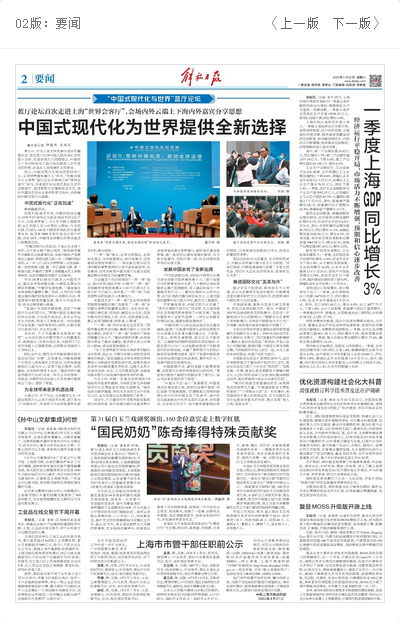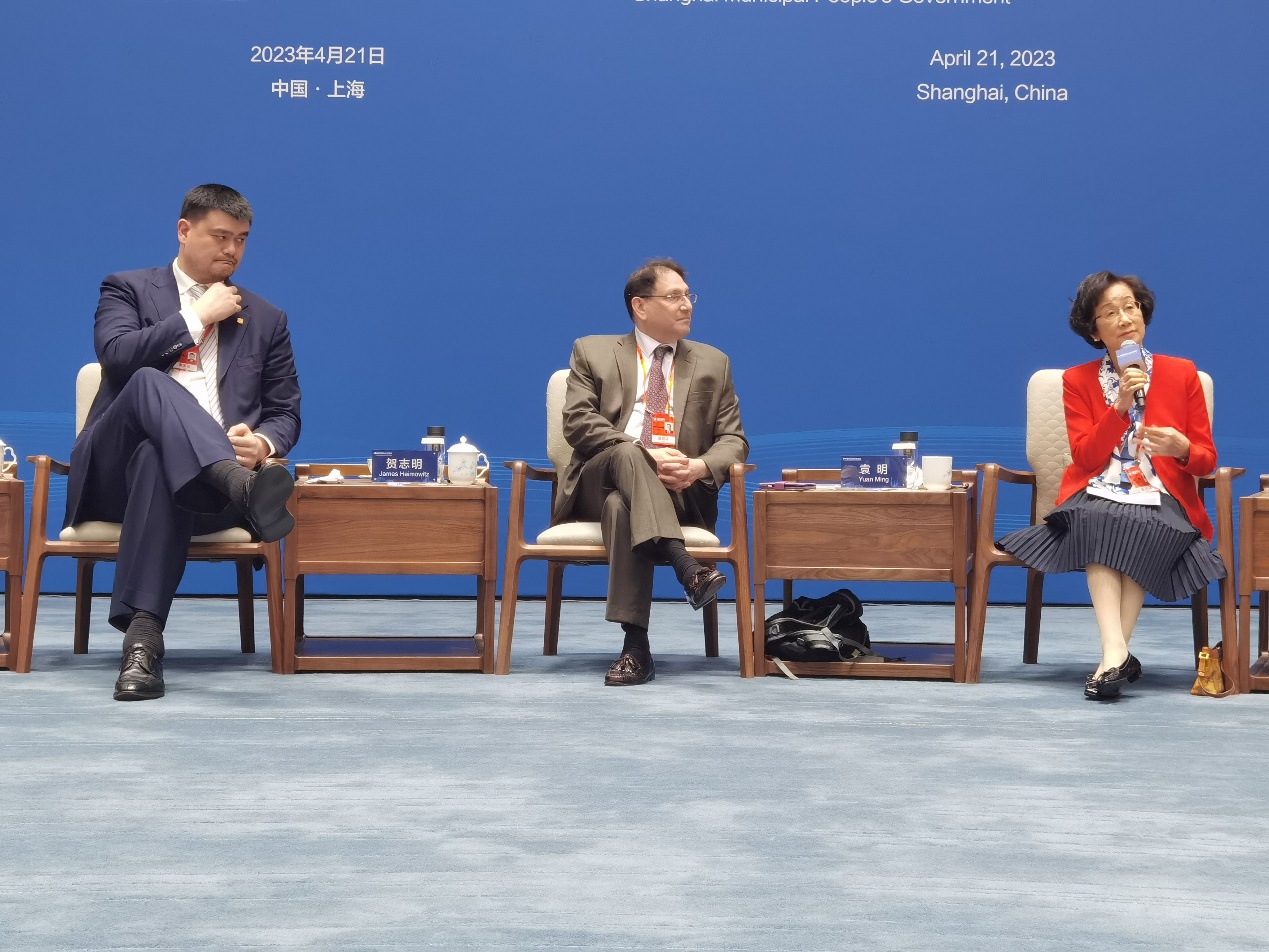On April 21, Professor Yuan Ming, Honorary Dean of Yenching Academy of Peking University, spoke at the Lanting Forum on Chinese Modernization and the World at the Grand Halls in Shanghai. Quoting the stories of modern youth, Prof. Yuan appreciated and attached importance to the voices and opinions of the youth.
The People’s Daily and Jiefang Daily published special reports on the Forum. The English translation below is based on the news report “Lanting Forum Is Held in the Grand Halls in Shanghai and Receives Guests On-spot and Online” from Jiefang Daily at: https://www.shanghai.gov.cn/nw4411/20230422/4e890a7d01b943dc9a7a802bea480c69.html.

Chinese Modernization: New Alternatives for the World
Modernization is a symbol of humanity’s development and progress. Attaining modernization has been a relentless pursuit of the Chinese people since modern times. China has realized, in a short span of several decades, a substantial level of modernization, a process that took developed countries several centuries. It has been a miracle in human history.
What is the key to the success of Chinese modernization? And what is its significance to the world? Domestic and foreign guests met, in person and online, at the Lanting Forum at the Grand Halls on the Huangpu River, Shanghai, to discuss the achievements in Chinese modernization. It was the first time the Lanting Forum had taken place outside of the Foreign Ministry’s Blue Hall (Lanting) since the Forum was established in 2010.

Chinese Modernization is Speeding Up
Data tells the truth.
Over the past 40-plus years since reform and opening-up, China’s economic aggregate has grown from 367.9 billion yuan in 1978 to 121 trillion yuan in 2022, the second largest in the world. The Chinese government has lifted over 800 million people from poverty and enlarged the middle-income group to over 400 million. Today, China is the leading trading partner of over 140 countries and regions, attracting over 3,000 foreign businesses monthly. Over the past decade, China has contributed more to global growth than all the G7 countries combined.
State Councilor and Foreign Minister Qin Gang delivered a keynote speech at the Forum. He pointed out that our success in Chinese modernization was not handed down from the heavens or just emerged by itself. It has been attained in a gradual, piecemeal process through the determined, painstaking efforts of the Chinese people under the leadership of the CPC, always staying true to its founding mission. We have turned China from an impoverished and backward land into the world’s second-largest economy, the top trader of goods, the biggest holder of foreign exchange reserves, and the largest manufacturer. We have set up the world’s most extensive compulsory education, social security, and medical and health systems.
Johnson & Johnson has run its business in China since the 1980s. Will Song, Global Senior Vice-President and Chairman of Johnson & Johnson’s China division, felt impressed by China’s fast development and highlighted that China is one of the fastest-growing markets in Johnson & Johnson’s global business. Song said that Johnson & Johnson had established an end-to-end R&D and innovation center and incubator in China. The company is confident in China’s high-quality development and high-standard opening-up strategies and looks forward to continuous growth in China.
Jean-Christophe Pointeau, China President of Pfizer Global Biopharma Business Group, said that he had witnessed China’s medical industry's modernization since he began working in China in 2011. He noticed that foreign and Chinese companies are working hard on innovation and believed that artificial intelligence would boost the industry’s development. Pointeau said that China is being modernized and China is speeding up Chinese modernization.
International participants in the Lanting Forum reiterated China’s achievements in poverty alleviation, agreeing that efforts for poverty alleviation are an icon of Chinese modernization. Since China adopted the reform and opening-up policy, the Chinese government has lifted over 770 million impoverished rural people out of poverty, accounting for over 70% of global poverty reduction.
Gambian Foreign Minister Mamadou Tangara admired China’s efforts for poverty alleviation. He said that China’s modernization had been widely viewed as a miracle in the history of human development. Tangara appreciated China’s path of modernization as a people-centered approach to poverty alleviation, common prosperity, and ecological conservation, among others. He noted that China is a beacon of hope for all developing countries and holds back “the perception of the continent as a place synonymous with brazen impoverishment.”
Chinese Modernization: New Opportunities for the World
As a Chinese saying goes, “A just cause should be pursued for the common good.” Participants at the Lanting Forum saw that the Chinese path to modernization is not a one-flower show aimed solely at China’s national development. Instead, it is a path for new opportunities for global development.
Essam Sharaf, former Prime Minister of Egypt, noted his familiarity with the public goods China has offered the world, including the Belt and Road Initiative (BRI), the Global Civilization Initiative (GCI), the Global Security Initiative (GSI), the Global Development Initiative (GDI), the New Development Bank (NDB), and the Asian Infrastructure Investment Bank (AIIB). He noted that Chinese modernization had contributed greatly to regional growth and stability.
The BRI was a common topic for the Forum participants. The value of trade in goods between China and BRI-participating countries grew from US$ 1.04 trillion in 2013 to US$ 2.07 trillion in 2022. Over the decade, the BRI has added new vitality to the world’s joint development.
Huang Renwei, Executive Vice Dean of the Fudan Institute of the Belt and Road & Global Governance, saw the BRI as a key connecting point between China and the global markets. Over the past ten years, the BRI has, aiming for high-standard, sustainable, and people-centered progress, contributed to smooth personnel, cultural, and economic and trade exchanges between China and BRI-participating countries, fulfilling the goals of facilities connectivity, policy coordination, and people-to-people bond.
Li Cheng, Director and Senior Fellow of the John L. Thornton China Center, noted that the BRI had benefited the participating countries as the middle class has continued to expand. He stressed that enhanced infrastructures. thanks to the BRI, have helped local people in the participating countries and created opportunities for them to go up into the middle-income group.
Kishore Mahbubani, a Distinguished Fellow at the Asia Research Institute (ARI), National University of Singapore (NUS), delivered a video speech on the Forum, hailing the China-ASEAN relationship as a model for international cooperation. Mahbubani believed that the ASEAN countries would not have seen rapid economic growth or social and cultural achievements in the past 20 years had they not signed the free trade agreement with China. Chinese modernization has created great opportunities for other developing countries.
The first-round negotiations of Version 3.0 China-ASEAN Free Trade Area (FTA) started this February. Ong Tee Keat, Chairman of the Center for New Inclusive Asia (CNIA), was confident in the China-ASEAN FTA, commenting that the two sides will deepen collaboration in the green economy and digital infrastructure construction where ASEAN companies may see new opportunities.
Participants also called for an efficient reform of international organizations. Zhou Qiangwu, Vice-President and Chief Administrative Officer of the New Development Bank, suggested that the World Bank (WB) and the International Monetary Fund (IMF) have part of their rights transferred to developing countries and jointly with NDB and AIIB provide the world more effective governance solutions.

New Choices for Developing Countries
Dilma Rousseff, President of the New Development Bank and former President of Brazil, said China’s modernization showed the world a different path, holding significant meaning to countries in the Southern Hemisphere. She said Latin American countries had been subordinated to the US and Europe for centuries, imposed false modernization, first in the form of colonialism and, more recently, in the form of neoliberalism, leading to wealth being concentrated in the hands of few people with millions of people discarded.
Rousseff said Chinese modernization demystifies the myth that modernization means Westernization. Chinese modernization lends new impetus to humanity’s search for better social systems. Every country should choose its path based on its conditions.
Chen Dongxiao, President of the Shanghai Institutes for International Studies (SIIS), noted that the success of Chinese modernization demonstrates that developing countries must take a path to modernization rooted in their history rather than depending on or blindly following others. Independence is the key. Chen pointed out that Chinese modernization is a governance solution from which other late starters may draw inspiration. China’s path to modernization adds a new piece to the modes of modernization. Chinese modernization shows more robust capacities and voices of developing countries in global governance, safeguarding and winning more rights to development for developing countries.
Fu Ying, China’s former Foreign Minister and Ambassador to the UK, highlighted that all nations are entitled to modernization, warning that developed countries should not see a developing country as a challenge or threat simply because that country has achieved modernization.
Zafar Uddin Mahmood, Special Assistant to the Pakistani Prime Minister, has lived in China for roughly 40 years and witnessed the forging of an all-weather strategic cooperative partnership between Pakistan and China. He said that China has never “imported” its development model; instead, it has explored an alternative path for developing countries through its experience in reform and opening-up. Zafar held that in the context of globalization, every country should contribute its ideas and have open, candid, and inclusive dialogues with others, to build a world of common prosperity.
“In Africa, there is no recollection of history that China has forcibly imposed its cultural ethos and abrogated the value and political systems of countries on the continent. For us, therefore, a Chinese Dream epitomizes a greater opportunity to widen the scope for mutually beneficial and friendlier political, trade, and cultural relations,” noted Tangara.
Building a Diversified and Harmonious World
Friendship derives from close contact between peoples and is critical to sound state-to-state relations. Participants in the Lanting Forum stressed that China needs more cultural exchanges to tell the world its story of modernization.
Malcolm Clarke, a British Oscar-winning director, emphasized the role of soft power and how to make it known to the rest of the world. He suggested that China leverages the power of popular culture when telling stories of its soft power beyond economic and technological achievements. To this end, Clarke quoted South Korean popular culture and media as an example, calling Chinese filmmakers and media workers to tell appealing stories of Chinese people and soft power.
Professor Yuanming saw the future in youths. She described the young people born after 1995 as Generation Z, less influenced by ideological frameworks and having broad visions. Prof. Yuan noticed that young people nowadays show deep concerns over the environment, education, and climate change, among other global issues. She appreciated the wisdom, passion, vigor, and vitality of young people working hard and collaborating for humanity’s future.
China Institute has been dedicated to promoting cultural exchanges between China and the US since its founding in 1926. James B. Heimowitz, President of China Institute, names himself “He Zhiming” in Chinese. He and China Institute work hard to introduce the Chinese culture and language to more American kids and forge stronger people-to-people exchanges between Chinese and American athletes and musicians.
Yao Ming, President of the Chinese Basketball Association, quoted Nelson Mandela, the late President of South Africa, that sports have the power to change the world. He also recalled the ping-pong diplomacy in the history of Chine-US relations. Yao believed basketball, a favorite sport in China and the US, would play a more prominent role in international exchanges for a diverse and harmonious world.